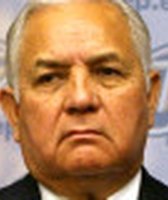Stand up for the facts!
Our only agenda is to publish the truth so you can be an informed participant in democracy.
We need your help.
I would like to contribute

Rafael Cruz and Sen. Ted Cruz, father and son (New York Times photo).
KEEP UP WITH THE MILWAUKEE DEBATE HERE.
Sen. Ted Cruz of Texas, who may be riding momentum from the CNBC debate into the eight-person Republican presidential debate in Milwaukee, frequently celebrates his father’s roots as a teenaged Cuban revolutionary turned refugee.
It’s a dramatic story that culminates, in part, in a nearly penniless Rafael Cruz making his way from jailhouse beatings to the University of Texas.
This week, though, a New York Times story suggests the elder Cruz, a minister who stumps for his son, may have embroidered his activism in Cuba, perhaps being more of an admirer of revolutionaries than among them.
Sen. Cruz’s campaign spokeswoman, Catherine Frazier, gave a statement to the Houston Chronicle criticizing the story, saying: "To repeat statements from Communist officials in Castro's Cuba regarding events from nearly 60 years ago as truth is irresponsible reporting and simply has no basis in truth. For the Batista soldiers who tortured and imprisoned Pastor Rafael Cruz, there was no such confusion."
Sign up for PolitiFact texts
The Times story says the family narrative that has provided inspirational fire to Sen. Cruz’s "speeches, debate performances and a recently published memoir is, his father’s Cuban contemporaries say, an embroidered one."
The story also says:
The elder Mr. Cruz, 76, recalls a vivid moment at a watershed 1956 battle in Santiago de Cuba, when he was with a hero of the revolution, Frank País, just hours before he was killed in combat.
In fact, Mr. País was killed seven months later and in a different place and manner.
In interviews, Rafael Cruz’s former comrades and friends disputed his description of his role in the Cuban resistance. He was a teenager who wrote on walls and marched in the streets, they said — not a rebel leader running guns or blowing up buildings.
Leonor Arestuche, 79, a student leader in the ’50s whom the Castro government later hired to verify the supposed exploits of revolutionary veterans, said a term existed for people like Mr. Cruz — "ojalateros," or wishful thinkers. "People wishing and praying that Batista would fall," she said, "but not doing much to act on it."
Still, the news story says, there’s no question the elder Cruz was beaten in 1957 at the hands of agents for Fulgencio Batista, the Cuban dictator.
"An old neighbor remembers soldiers bloodying the 18-year-old Mr. Cruz’s face and driving off with him that summer," the story says. And the elder Cruz "gives a harrowing account of soldiers beating him over three or four days, stomping on the back of his head and breaking his teeth. A mug shot in his son’s book shows him with a bruised nose, and a 1959 article in The Daily Texan, the student newspaper at the University of Texas at Austin, which he attended after fleeing to the United States, reported he had lost ‘half of his upper denture’ in the beatings."
But, the story says, the reason Cruz was arrested is less clear; he has offered different explanations. In a March interview alongside his son, the story says, Cruz said he had sought to recruit to the revolutionary cause someone who turned out to be an informant working for Batista’s regime. The 1959 account, though, did not mention any informant; Rafael Cruz said then that the authorities were alerted to his involvement in the resistance by another man, who gave up only Cruz’s name after Batista’s forces beat it out of him and left him bleeding in the same cell as Cruz, the story says.
"Mario Martínez, who Cruz confirmed was part of his small revolutionary cell, said he did not recall Cruz’s being apprehended for trying to recruit someone and said he believed that the cause of his old comrade’s detainment was possession of a revolver — one that Cruz had never used," the story says.
According to Martínez’s account, the newspaper says, he and Cruz had belonged to the youth brigade of Fidel Castro’s 26th of July Movement in their hometown, Matanzas, but had done little besides join in protest marches. They never turned to violence, he said.
The Times story says it’s certain that in the summer of 1957, Cruz did something to catch the attention of Batista’s enforcers, who patrolled on horseback. Carmen García, a neighbor, recalled learning that a Jeep full of Batista soldiers had picked up Cruz, the story says, quoting her saying: "No one knew he was supposedly conspiring against anything."
The story says Cruz’s Cuban saga ends with him hidden in the back seat of his father’s car in late 1957 as they drove along the coast to Havana, where he boarded a ferry and sailed to Miami, before continuing on to Austin. "Since then, his native island has existed for his family as a remote but enduring political reference point," the story says.
Our Sources
News story, "Cuban Peers Dispute Ted Cruz’s Father’s Story of Fighting for Castro," New York Times, Nov. 9, 2015
News story, " Report questions Ted Cruz's father's Cuba story," Houston Chronicle, Nov. 9, 2015
Profile story, "For evangelical voters, Rafael Cruz may be Ted’s best apostle," Austin American-Statesman, July 31, 2015









































